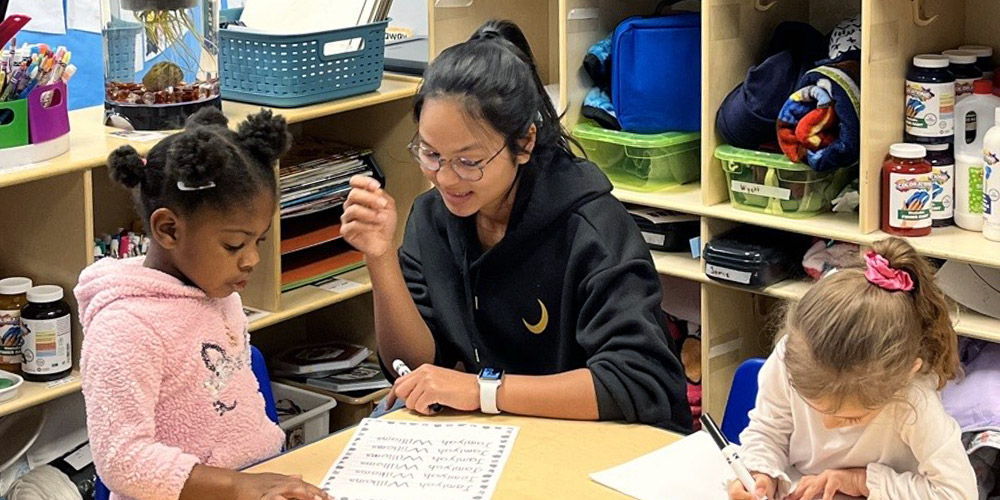
|
|
Editor’s note: This press release was originally published by The Pre-K Priority.
With state legislators still working on a long-term funding agreement to stabilize North Carolina’s child care landscape, The Pre-K Priority is demonstrating that investments in pre-K educators and classrooms can have a major impact on kindergarten readiness and teacher retention.
The Pre-K Priority received $4 million from the Forsyth County Board of Commissioners and the City of Winston-Salem through the American Rescue Plan Act (ARPA) for a unique two-year community collaborative to establish a local foundational model for high-quality pre-K. Participating organizations include Smart Start of Forsyth County, Family Services, Winston-Salem/Forsyth County Schools (WS/FCS), Child Care Resource Center, Hispanic League and Forsyth Futures. In 2023, the collaborative selected 30 pre-K classrooms across WS/FCS, Head Start, NC Pre-K, and independent/private pre-K providers to participate in the initiative, which began with the start of the 2023-24 school year.
“As a community collaborative, we were intentional in providing these local classrooms and educators with specific high-quality resources and supports that were currently limited or nonexistent,” said Leslie Mullinix, project director for The Pre-K Priority. “Our holistic approach includes supports for our educators, resources for their classrooms, and advocacy for the participating pre-k students and their families.”
The Pre-K Priority hosted a community presentation entitled “Our First Priority” to share Year 1 results showing significant progress in terms of teacher retention, kindergarten readiness, and family engagement. The Pre-K Priority’s full Year 1 Report can be found at prekpriority.org/arpa.

Key highlights include:
- 85% retention rates for educators in the Pre-K Model Cohort Classrooms compared to national rates for early childhood educators of 63-84%. Educator supports include Success Coaches, professional development, tuition assistance, retention bonuses, and supplements to bring pre-k educators in independent/private centers to salary parity with WS/FCS educators based on experience and credentials.
- Impressive gains in a single school year for the more than 400 participating pre-k students. Preliminary TSGold* data suggests children have experienced growth in literacy, math, and social emotional development since fall 2023.
- Student daily attendance exceeded 89% as families are engaged in their child’s pre-K experience and supported by Family Advocates and interpretation/translation assistance for English Learning households.
- Approximately 400 family assessments were conducted during Year 1, and 142 families created Family Goal Setting Agreements.
The Pre-K Priority’s Year 1 implementation efforts were tracked and consolidated into one reporting system in order to assess results of the services provided by the various participating organizations. These results are informing Year 2 work and will be the basis for a new, integrated data system for the entire pre-K landscape in Forsyth County.
“As a community and for our county and city leaders, we should all be incredibly proud of the investment we’re making in supporting a high-quality pre-K landscape in Forsyth County and the significant results coming from that investment,” said Dr. Louis Finney Jr., chief executive officer of Smart Start of Forsyth County. “Four-year-olds learn more and faster during this one year of pre-k than almost at any other time in life. Improving access to quality pre-K experiences in Forsyth County enables our youngest learners to be better prepared — socially, physically and mentally — for kindergarten and beyond.”
Smart Start of Forsyth County provides administrative oversight of the two-year Pre-K Model Cohort Classroom initiative and directs the delivery of classroom- and teacher-focused services and supports.

Heading into Year 2, The Pre-K Priority will return to those same 30 classrooms with some refinements to its existing resources and supports based on Year 1 learnings. Additionally, it will begin implementation of an overall Pre-K Equity Action Plan in partnership with the Office of Equity, Access, and Acceleration at Winston-Salem/Forsyth County Schools. In Year 1, the team designed and implemented an Equity Observation Tool and Curriculum Audit Tool to guide the Action Plan.
Shenell Thompson, Senior Program Officer for Local Impact at Kate B. Reynolds Charitable Trust, spoke about the importance of pre-K. “The Trust has long supported The Pre-K Priority to increase access to pre-K, as every child deserves a good start in life. We know that early experiences and environment can have a lasting impact on brain development, setting children up for later success in school and life. However, expensive programs, long waitlists and bias keep many children — particularly children in families with low incomes and children of color — from accessing high quality pre-K, and that’s unacceptable. Through our Great Expectations work, we continue to advocate for universal pre-K in Forsyth County and are focused on increasing equity and opportunity across the early childhood system.”
To learn more about the work of The Pre-K Priority, visit prekpriority.org.
*Teaching Strategies Gold® (TSGOLD) is an evidence-based, ongoing observational assessment to evaluate Kindergarten Readiness in literacy, math, and social/emotional development.



